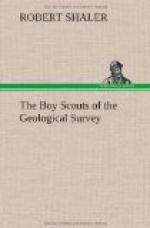“’Assisted by his schoolmates, he would follow up and measure off the boundary lines between the farms, such as fences, roads, and water courses; then those dividing the different parts of the same farm; determining at the same time, with the help of his compass, their various courses, their crooks and windings, and the angles formed at their points of meeting or intersection. This done, he would make a map or drawing on paper of the land surveyed, whereon would be clearly traced the lines dividing the different parts with the name and number of acres of each attached, while on the opposite page he would write down the long and difficult tables of figures by which these results had been reached. All this he would execute with as much neatness and accuracy as if it had been left with him to decide thereby some gravely disputed land claim.’”
Lieutenant Denmead paused and glanced at the group of faces steadily turned toward him. Then he resumed:
“’The habit of mind thus cultivated continued through life; so that, however complicated his tasks and overwhelming his cares, he found time to do everything, and to do it well. He had acquired the magic of method, which of itself works wonders.’”
“’When about sixteen years old, George Washington was asked by his friend, Lord Fairfax, to make a survey of the latter’s extensive lands, a vast territory lying between the Potomac and Rappahannock Rivers. He undertook the commission in the early spring, when the mountains were still white with snow and the streams had swollen into torrents. He was clad in a buckskin hunting shirt, with leggings and moccasins of the same material, the simple garb of a backwoodsman, in perfect keeping with the wildness of the scenes he had to encounter. In his broad leathern belt were stuck a long hunting-knife and an Indian tomahawk. As he rode his horse, he frequently carried in his left hand his useful compassstaff.’”
“’The enterprise upon which Washington had entered was one of romance, toil, and peril. It required the exercise of constant vigilance and sagacity. Here and there in the wilds ran narrow trails through dense thickets, over craggy hills, and along the banks of streams; but when they might lead the young surveyor into the camps of squatters or Indians, no one could tell.’”
As the Scout Master stopped again, he found the boys listening with breathless interest, and he guessed that many of them were following the explorations of Washington in imagination.
“This next paragraph,” he said, “reminds me of some of our own experiences on a hike. Listen: ‘My companions and I,’ wrote Washington in his journal on April eighth of that year, ’camped in the woods; and after we had pitched our tent and made a large fire we pulled out our knapsacks to recruit ourselves. Every one was his own cook. Our spits were forked sticks, our plates were large chips. As for dishes, we had none.’”




